North Country Girl: Chapter 48 — The Accidental Model
For more about Gay Haubner’s life in the North Country, read the other chapters in her serialized memoir.
James and I were on our way back to Mexico, driving his El Dorado from Chicago to Acapulco, probably the only time a Cadillac has been used as economy transport. After escaping from the police in Dallas, it was a relief to finally see the signs telling us the Mexican border was near — no more Texas! At the border crossing we were greeted with no more than the usual stares at the sight of a forty-three-year-old man and a twenty-one-year-old blonde in a new El Dorado covered in a layer of Texas dust; border patrol officials on both sides spent more time looking at us than at our passports.
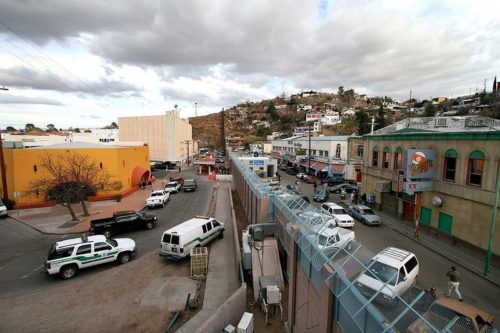
As soon as we crossed the border, James, who had driven though most of Texas, pulled to the side of the road, slumped over, and mumbled that he had to get some sleep. We switched seats, I took over the wheel, and I drove into bedlam. Gone were the smooth, well-maintained US highways. I had to swerve into the other lane or the shoulder to avoid potholes that would have swallowed up the Caddy. There were also: long stretches of road that no one had gotten around to paving, men on horseback, kids leading burros, cows, pick up trucks carrying gigantic, loosely tethered cargo, buses with people riding on the top, flatbed trucks with 60-foot logs rattling away, more cows, dead dogs covered with frightening black clouds of vultures, and barefoot vendors with peeled oranges, bags of soft drinks, tamales, back scratchers, and loose cigarettes, all standing way too close to oncoming traffic, and sometimes even in the middle of the road. All of these nightmares were shrouded in a smog of exhaust and dust particles that hovered a constant three feet off the ground.
I had a death clutch on the steering wheel, but managed to pry my right hand loose, reach over, and switch off Linda Ronstadt. Music was too much of a distraction, and how many times had I heard “Blue Bayou” on this trip already? It was just as hard to tear my eyes from the hellish road; when it finally seemed safe, a quick glance showed me a James dead to the world, snoring slightly, mouth dangling open, looking quite a bit older than forty-three. My eyes and hands and mind fixed to the task at hand.
I drove for hours, deep into the Sonoran desert, where the traffic and the villages thinned out and I realized I had been clenching my jaw and my sphincter way too tight. The sun was setting to my right, a golden yolk dropping behind distant hills, setting the desert on fire. For a few minutes, everything was lit like a J.M. Turner painting, only a lot more arid. But here was night, drawing across the sky like a dark blue blanket, and then everything went black. I turned on the headlights and quickly switched to high beams, which flickered weakly through the still settling dust.

I noticed that the El Dorado seemed to be the only car going in either direction that had a working pair of headlights. Most drivers felt that the light of the moon was all the illumination they needed, while some cars had a single, dim headlight; I had to guess if it was the right or left one. It was like an awful game of chicken in some black and white teen movie. I crept along as far to the right of the road as possible, hoping no one was out for a stroll along the highway at seven at night, till I saw the flickering of a Vacantes motel sign. I didn’t care about cleanliness, price, nothing. I wanted out of the car.
After a night spent in an iron bedstead and a breakfast of tortillas and beans washed down with Nescafé, I said to James, “I am never driving in Mexico, day or night, again.” James teased me as a coward, and did the day’s drive, which was uncannily identical to the one the day before, with as much aplomb as if he had been toodling down Chicago’s Lakeside Drive. But that evening, when James got to experience the odd penchant Mexicans have for driving through the pitch dark countryside with their headlights off, he surprised me by pulling into a motel after only eleven hours behind the wheel.
By late afternoon of our third day in Mexico, we were winding up the mountains behind Acapulco, chasing the last rays of sun vanishing off in the west. We crested the top, and there, slipping in and out of sight as we made the hairpin turns downward, was Acapulco Bay, just visible as a silvery gleam separate from the velvet sky, where a thousand lights sparkled. James sighed, smiled, and reached over to take my hand. We were back.
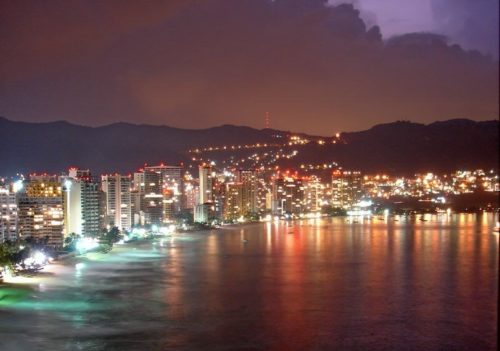
It only took a few hours for James to find a place for us. Our home for the next few months was not oceanfront; it was even farther up the hill than the apartment I had shared with the three French Canadian girls. The building looked like a motel. Three blocky two-bedroom units shared a single umbrella table, four lounge chairs, and a shallow little pool that did have an eye-popping view of Acapulco. The other two units stood strangely empty the entire time we lived there. Our rent included daily maid service. A tiny, silent woman came in every morning, made us coffee, cleaned the apartment, took away our dirty laundry, and always asked if we would like lunch. James couldn’t or wouldn’t think ahead to meals, but once she left us a plate of chicken sandwiches that was one of the most delicious things I have ever eaten.
James and I fell back into last winter’s languid pleasure-seeking days, with only a few modifications. His budget did not allow for a season’s membership at a private beach club or for daily water-skiing. James shrugged off these deprivations without losing too much of his self-esteem. “Next year,” he told me.
When I had first met James he could go days without checking his portfolio, confident that his stock picking acumen meant that there was nowhere to go but up. Now every morning we drove down to the Sheraton’s newsstand, where James bought yesterday’s New York Times, lit a cigarette, and nervously tore through the papers to the stock market quotes.
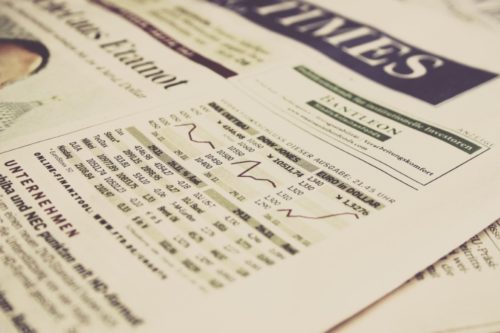
James’s mood depended on that day-old news. If his stocks were down, he was furious with frustration: he had no way of contacting his broker other than waiting in line for hours at the sweltering office of the inept Mexican telephone company to make a long distance call. On those bad days I could look forward to hours of James taking on all comers at backgammon at the Villa Vera. He believed he could recoup some of his stock market losses by gambling, and he was desperate to prove to himself that he was a winner. He did win a lot, having the sharpie’s eye for novice players who were easily scalped, or blowhards who James taunted into making stupid moves and accepting hopeless doubles. His obsession left no time for meals. I spent those days at the Villa Vera swim-up bar, trying to fill up on bullshots (vodka and beef consommé), and wondering what our Mexican maid would have served for lunch.
The blessed days his stock posted a bit higher, the old preening, confident James reappeared. On one of those mornings James looked up from the business section with his vulpine grin and said, “Let’s have breakfast.” He took the paper and me to one of the Sheraton’s palm-shaded beachside tables, where I devoured a cheese omelet and everything in the bread basket, just in case. James was scribbling on the stock quotes and I was licking the last delicious buttery crumbs off my fingers, when a good-looking man, American by haircut, demeanor, and madras shorts, walked up to the table and introduced himself.
He was the director of a commercial promoting Mexican tourism and the model they were supposed to be filming that day hadn’t shown up. The director asked me, “Would you like to be in the commercial? I can pay you a hundred dollars. All you have to do is run back and forth on the beach for an hour.”
James piped up, “Yes, she’d love to!” while I felt a sharp pang of regret about the four buttered rolls I had just eaten. I was wearing nothing but my cute bronze bikini, a shade darker than my skin, held together in strategic places by golden rings.
I followed the director down to where the waves frothed on the shore. It was the perfect Acapulco day, so gloriously sunny and balmy that it would inspire any snowbound Midwesterner to immediately start packing his bags.
The director pointed up and down the beach, in case I didn’t know where it was, said “Okay, start running,” and then yelled something at the cameraman. I ran, hopped, skipped, splashed, smiled, waved, and jumped around like an idiot, followed by the cameraman and the director, who kept yelling “Happier! Look happier!”
James stayed back at the Sheraton, stretched out on a lounge chair, admiring his handiwork each time I ran by. When it was over the director handed me a hundred dollar bill and promised to send me a copy of the commercial. At least I got the money. I saw the commercial once on TV, and only recognized it because my first thought was, “Hey, I have that same bikini.”
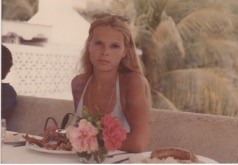
My sudden and accidental elevation into a professional model was a bigger boost to James’ ego then it was to mine. At the Villa Vera, he called me up from my swim-up bar stool to introduce me to yet another backgammon pigeon, saying, “This is my girlfriend, she’s a model.” James beamed as if he had sculpted me himself, a wolfish Pygmalion, and stroked my butt for good luck. Look, he was signaling his opponent, look at me, lucky and successful, a winner with a sexy young girlfriend. And now I’m going to beat the pants off you. Most of the time, he did. I was rewarded for my supporting role with thin gold chains for my wrist and neck, bijoux de plage, the sales lady said, simple and elegant. I still thought the uncut emeralds would look just fine on the beach.
For a few weeks, as his stocks kept ticking upwards, James gleefully slaughtered all comers at backgammon, and we were back in the Acapulco groove, as if no time or money had been lost, back to waterskiing in the morning, afternoons at Le Club (our entry into this private, posh oasis bought by James with a folded bill discretely palmed to the maitre d’), Carlos ’N Charlie’s for drinks and dinner if James was eating that evening, then always, always dancing at Armando’s.
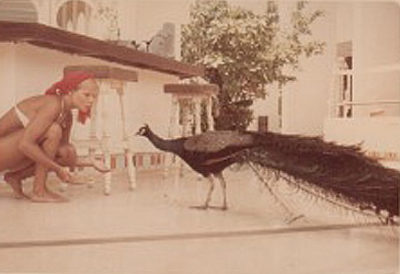
It was the last good time.
One morning, James opened the New York Times to the stock pages and a black cloud covered his face and mood. This cloud did not blow away, but grew heavier and more ominous each day. There was nothing I could say, nothing I could do, except that hope tomorrow’s news would be better. It wasn’t, and neither was the next day’s. There was nothing James could do either, except watch his fortune evaporate. There was no more waterskiing, no more afternoons watching the peacocks strut around Le Club’s enormous pool. James got up in the morning, threw back his coffee, and headed straight for the Villa Vera. In their shadowy backgammon room James challenged his opponents to higher and higher stakes and became aggressively reckless with the doubling cue. It didn’t matter if he was winning or losing, I couldn’t bear to watch. I was grateful whenever James forgot to call for his lucky charm before facing a new opponent.
It didn’t seem possible, but meals became even more irregular. I looked in the mirror: I was model-skinny. James went from thin to cadaverous. Even though the sun shone every day, we carried our own bad weather with us. The fun, the glamour, were gone. We didn’t dance any more; James showed up nightly at Armando’s because that was what a happening guy in Acapulco did. He watched the happy couples on the dance floor and threw back vodka and sodas. I held my hands over my flip-flopping empty stomach and tried to figure out what would happen next.
It did not surprise me when James turned outlaw. There was always something felonious about him, a suspicion that there was a crime in his past or in his future.
Enough of winter had passed that it was safe for James to go back to Chicago without loss of face. He began planning our drive north, a plan that now included drug smuggling.